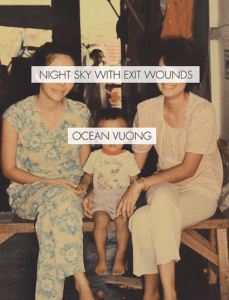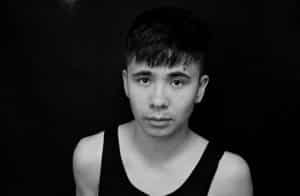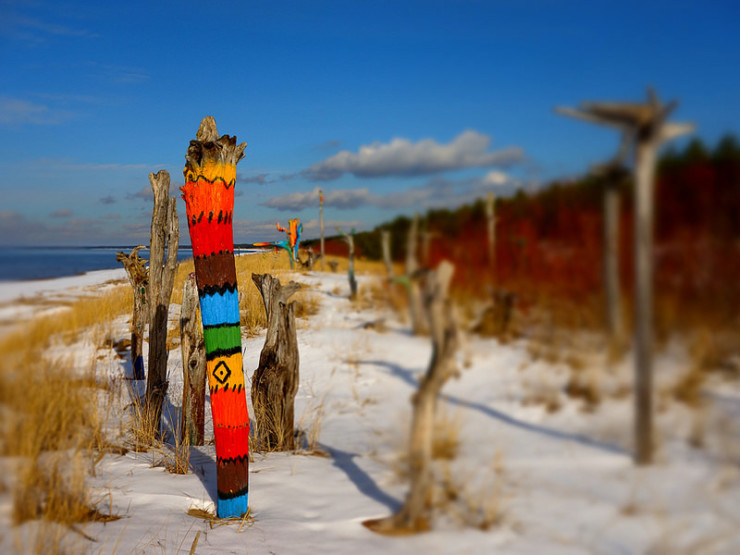Poet Ocean Vuong spent the first two years of his life in a refugee camp. When he was two, he and his mother and grandmother settled in the United States. He never knew his father. He grew up hearing the stories of Vietnam from his mother and grandmother. Born in a country he can’t remember, with a father he never knew, and likely asking questions that could never be answered, Vuong did what many of us might do.
He created a past life. Part of that creation became Night Sky with Exit Wounds, which won the 2016 Whiting Award and has now won the 2017 T.S. Eliot Prize.
The collection comprises some 35 poems. Several of the poems are directly about his father, and Vuong imagines different reasons (and realities) for not knowing him. His father was imprisoned. His father is shot and dumped in the ocean, his body washing up on a beach. His father drowns in Newport Beach, California. His father is caught up in what happened in Vietnam. His father is an American soldier. The family is sailing on a refugee boat, fleeing a burning city. Vuong creates these different realities to fill a void, a painful void, one that leaves the poet experiencing his own “exit wounds.”
The poet also imagines what might be his own creation.
A Little Closer to the Edge

will change them, they step, hand-in-hand,
into the bomb crater. The night full
of black teeth. His faux Rolex, weeks
from shattering against her cheek, now dims
like a miniature moon behind her hair.
In this version, the snake is headless—stilled
like a cord unraveled from the lovers’ ankles.
He lifts her white cotton skirt, revealing
another hour. His hand. His hands. The syllables
inside them. O father, O foreshadow, press
into her—as the field shreds itself
with cricket cries. Show me how ruin makes a home
out of hip bones. O mother,
O minutehand, teach me
how to hold a man the way thirst
holds water. Let every river envy
our mouths. Let every kiss hit the body
like a season. Where apples thunder
the earth with red hooves. & I am your son.
The poem is filled with the kinds of sharp and vivid images and metaphors found throughout the collection—the faux Rolex watch dimming like a miniature moon, a home made of hip bones, a night full of black teeth, a headless snake, a field shredding itself with cricket cries. Vuong creates jarring, often disquieting, abrupt and unexpected pictures, almost forcing us to acknowledge a truth in these self-created realities.

Ocean Vuong
In addition to the Whiting Award and the T.S. Eliot Prize, Vuong has received a number of other honors and recognitions—a Ruth Lilly Fellow; a Pushcart Prize; and honors from the Civitella Ranieri Foundation, the Elizabeth George Foundation, the Academy of American Poets, and others. He received the Stanley Kunitz Prize for Younger Poets from the American Poetry Review. His poems have been published in numerous literary and poetry journals, and he is the author of Burnings (2010). He is an assistant professor in the MFA Program for Poets and Writers at the University of Massachusetts-Amherst.
The poems of Night Sky with Exit Wounds are often graphic; several of the poems are about sex. Many of the poems imply that the absent father has led the poet on his own search for his fundamental identity. Tinged at times with anger, sadness, and yearning, it is a stunning, haunting collection.
Related:
Ocean Vuong talks about his work
Ocean Vuong reads from Night Sky with Exit Wounds
T.S. Eliot Prize: Jackself by Jacob Polley
Poets and Poems: Sarah Howe and Loop of Jade
Photo by Artis Rams, Creative Commons, via Flickr. Post by Glynn Young, author of the novels Dancing Priest, A Light Shining, and the newly published Dancing King, and Poetry at Work.
__________________________

“I require all our incoming poetry students—in the MFA I direct—to buy and read this book.”
—Jeanetta Calhoun Mish
- Longfellow’s “Paul Revere’s Ride”: Creating a National Legend - April 17, 2025
- Poets and Poems: Katie Kalisz and “Flu Season” - April 15, 2025
- Poets and Poems: Michelle Ortega and “When You Ask Me, Why Paris?” - April 10, 2025

Maureen says
‘…Let every kiss hit the body//like a season….’ Oh, to write like that !
Vuong, whose lyrical collection I’ve read several times, is one of the most talented poets to appear in a long time. His awards are well-deserved. I look forward to reading whatever he publishes next.